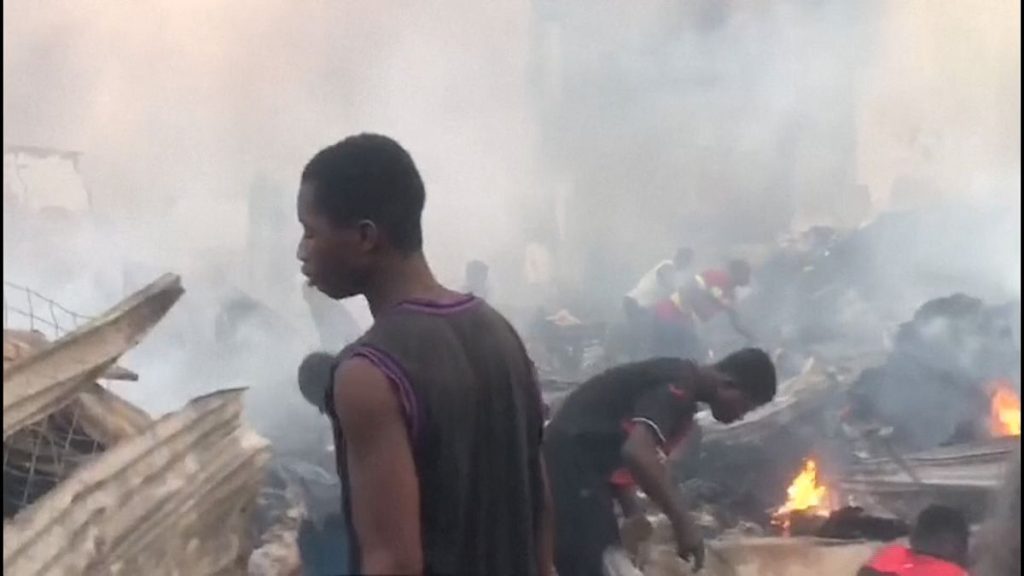The Makola Market in Accra, Ghana, a bustling hub of commerce and cultural exchange, recently succumbed to a devastating inferno that ravaged a significant portion of its infrastructure, leaving behind a trail of destruction and economic hardship. The fire, which erupted in the early hours, rapidly engulfed numerous shops and stalls, reducing years of hard work and investment to ashes. Thick plumes of smoke billowed into the Accra sky, a stark testament to the scale of the disaster unfolding below. The immediate aftermath saw frantic efforts by firefighters to contain the blaze, hampered by the market’s dense layout and the highly flammable nature of many goods sold within its confines. Traders watched helplessly as their livelihoods went up in flames, a scene of devastation punctuated by the crackling of burning debris and the hiss of water against intense heat. The incident underscores the vulnerability of markets in developing nations, often characterized by tightly packed stalls, inadequate fire safety measures, and limited access for emergency responders.
The exact cause of the Makola Market fire remains under investigation, with authorities exploring several possibilities, including electrical faults, accidental fires from cooking equipment, and even arson. Markets like Makola, with their intricate network of electrical wiring, often lack proper maintenance and oversight, making them susceptible to electrical malfunctions that can spark fires. The prevalence of open flames used for cooking and heating in some sections of the market also presents a constant fire hazard, especially when combined with flammable materials like textiles, plastics, and dried goods. While the possibility of arson cannot be ruled out, it is crucial to avoid speculation until a thorough investigation yields conclusive evidence. Determining the root cause is crucial not only for accountability but also for implementing preventive measures to mitigate the risk of future incidents in Makola and other markets across the country.
The economic fallout of the Makola Market fire is significant and far-reaching. Thousands of traders, many of whom rely solely on their market businesses for income, have lost their inventory, equipment, and trading spaces. The ripple effects extend beyond the immediate victims, impacting suppliers, transporters, and customers who depend on the market’s diverse offerings. The fire has effectively disrupted a vital economic artery within Accra, affecting the livelihoods of countless individuals and families. The loss of income translates to food insecurity, difficulties meeting basic needs, and potential setbacks in education and healthcare. The overall impact on the local economy is substantial, requiring a concerted effort from government and non-governmental organizations to provide relief, facilitate recovery, and implement long-term solutions.
The response to the Makola Market fire has been a mix of immediate emergency action and longer-term recovery planning. Firefighters battled the blaze for hours, working tirelessly to control the spread and eventually extinguish the flames. Emergency medical services were on standby to treat any injuries, while police personnel secured the area and managed the crowds of onlookers and distressed traders. In the aftermath, government officials visited the scene, assessing the damage and pledging support to the affected traders. Relief efforts have included the distribution of essential supplies, temporary relocation assistance, and the establishment of a fund to support rebuilding efforts. However, the scale of the disaster requires a sustained and coordinated response to ensure that the market community can rebuild their livelihoods and the market can regain its economic vitality.
The Makola Market fire serves as a harsh reminder of the critical need for improved fire safety measures in markets across Ghana and other developing nations. Investing in fire prevention infrastructure, such as fire hydrants, sprinkler systems, and fire-resistant building materials, can significantly reduce the risk and impact of such disasters. Regular fire safety inspections and training programs for traders can empower them to identify and mitigate potential hazards. Developing and enforcing building codes that prioritize fire safety is essential to prevent overcrowding and ensure adequate access for emergency responders. These measures, while requiring initial investment, are ultimately cost-effective in preventing the devastating human and economic losses that result from market fires.
Rebuilding the Makola Market will be a complex undertaking, requiring a multi-faceted approach that addresses both the immediate needs of the traders and the long-term sustainability of the market itself. Reconstruction efforts should prioritize modern building designs that incorporate fire safety features, efficient waste management systems, and improved sanitation facilities. Providing access to affordable credit and microfinance initiatives can empower traders to restock their inventory and restart their businesses. Developing a comprehensive market management plan that addresses issues like overcrowding, waste disposal, and emergency preparedness is crucial for ensuring the market’s long-term viability and resilience. The rebuilding process presents an opportunity to not just restore the market but also to enhance its functionality, safety, and economic potential, creating a more resilient and prosperous marketplace for the future. The tragedy at Makola Market should serve as a catalyst for positive change, prompting a nationwide focus on market safety and ensuring that such devastating incidents are minimized or prevented in the years to come.














